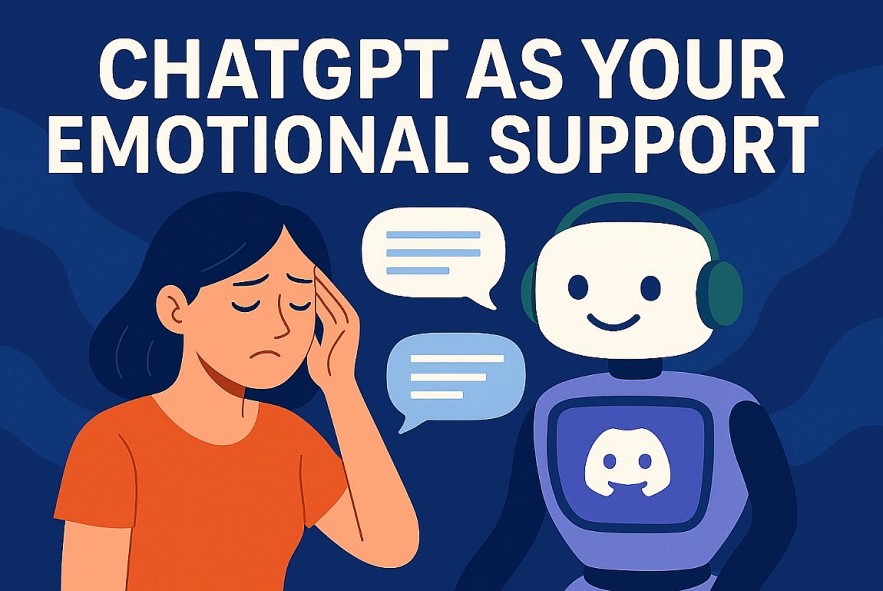ChatGPT as Your Emotional Support: Exploring AI in Mental Health
 How AI Is Rewriting the Rules of Web Traffic - and What You Can Do About It How AI Is Rewriting the Rules of Web Traffic - and What You Can Do About It |
 How to Make Content Stand Out in the Age of AI: SEO + Strategy Guide How to Make Content Stand Out in the Age of AI: SEO + Strategy Guide |
In an increasingly digital world, loneliness and emotional stress have become common threads in the lives of many. While social media connects us superficially, deep emotional support is often harder to come by. As a surprising solution, more and more people are turning to artificial intelligence—not for entertainment or productivity, but for comfort.
ChatGPT, a conversational AI, is quietly becoming a tool people use to process thoughts, reflect on emotions, and find temporary relief in moments of stress or isolation. But can AI truly support our mental wellbeing?
 |
| ChatGPT for mental wellbeing |
Using ChatGPT to Express Emotions Freely
One of the biggest barriers to emotional expression is fear of judgment. Talking to friends, coworkers, or even therapists can be difficult when vulnerability is involved. ChatGPT offers a private, neutral, and always-available space where users can say exactly what they feel—without fear of being misunderstood or interrupted.
For many, just writing to an empathetic-sounding AI can be a release in itself. Whether it’s venting about a bad day or processing complex feelings, having a “listener” helps.
Getting Guided Journaling Prompts
Journaling is a proven method for improving mental clarity, reducing anxiety, and building emotional resilience. But getting started—or knowing what to write about—is often the hardest part.
ChatGPT can serve as a personal journaling coach. It can suggest writing prompts tailored to your mood or situation, such as:
-
“What emotions have you been ignoring lately?”
-
“Describe a recent situation that made you feel overwhelmed.”
-
“What does self-compassion look like for you today?”
This structured reflection helps people build healthy introspection habits over time.
Roleplaying Supportive Conversations
Sometimes, people don’t need advice—they need someone to talk to. ChatGPT can simulate conversations with a calm, non-judgmental tone, offering simple validation and emotional mirroring.
It can take on the role of a supportive friend or even a gentle coach. For instance, users might prompt:
-
“Can you talk to me like a friend who cares?”
-
“Help me process my anxiety before this interview.”
-
“Pretend you’re my older sibling giving me perspective.”
While not a substitute for real relationships, these simulated dialogues can help regulate emotions and prepare people to communicate more openly with others.
Setting Reminders for Self-Care Routines
When people feel down or overwhelmed, even basic self-care can fall through the cracks. ChatGPT can help by generating gentle reminders and organizing simple routines for physical and emotional wellness.
Users can ask it to:
-
Create a morning ritual focused on mindfulness
-
Remind them to drink water, rest, or take screen breaks
-
Suggest 5-minute mood-boosting activities based on current energy levels
Small nudges like these encourage consistency in taking care of one’s mental health.
Limitations and Ethical Considerations
Despite its usefulness, ChatGPT is not a licensed therapist. It does not understand emotions the way humans do, and it cannot offer clinical help, diagnose conditions, or respond to crisis situations appropriately.
It’s essential for users to understand the line between AI support and professional care. While ChatGPT can offer comfort and structure, it should never replace mental health professionals, especially in serious or urgent cases.
Ethical use also requires privacy awareness. Users should avoid sharing highly sensitive or personally identifiable information in AI interactions.
Final Thoughts
ChatGPT is not a replacement for therapy—but it can be a valuable support tool when used thoughtfully. For people facing stress, isolation, or emotional fatigue, it provides a space to reflect, reset, and feel heard—even if only temporarily.
This emerging use of AI isn’t about replacing human connection. It’s about filling the silence when no one else is available. It’s about helping people pause, breathe, and carry on—until they’re ready to seek deeper healing.
Frequently Asked Questions (FAQs)
1. Can ChatGPT provide emotional support?
Yes, ChatGPT can simulate supportive conversations and offer a non-judgmental space for expression. While it cannot replace human empathy, it can help users process thoughts, manage stress, or feel temporarily supported.
2. Is ChatGPT a replacement for a therapist?
No. ChatGPT is not a licensed therapist and should not be used as a substitute for professional mental health care. For anxiety, depression, trauma, or crisis support, users should seek help from qualified professionals.
3. How can I use ChatGPT for journaling or reflection?
You can ask ChatGPT to suggest journaling prompts based on your current mood or challenge. It can guide you with questions like “What’s one thing you need to let go of today?” or “Describe a moment of joy from this week.”
4. Is it safe to share personal thoughts with ChatGPT?
ChatGPT does not store personal conversations, but users should still avoid sharing sensitive personal details like full names, addresses, or confidential health records in any chat.
5. What are the best prompts for emotional support?
Helpful prompts include:
-
“Talk to me like a supportive friend.”
-
“Help me calm down before a stressful event.”
-
“Give me affirmations to feel more confident.”
-
“Suggest a 5-minute self-care routine for tonight.”
 Top 10 Best Free AI Tools for Excel to Work Smarter in 2025 Top 10 Best Free AI Tools for Excel to Work Smarter in 2025 This article reviews and ranks the top 10 best free AI tools for Excel in 2025, analyzing their features, pros, cons, and suitability for different ... |
 OpenAI Restricts Ghibli-Style AI Images as Demand Surges and Policy Tightens OpenAI Restricts Ghibli-Style AI Images as Demand Surges and Policy Tightens OpenAI has banned Ghibli-style AI portraits, citing policy updates and system overloads as demand for image generation surges across ChatGPT platforms. |
 Top 20 Most Visited AI Tools in 2025: Monthly Traffic Rankings (Updated List) Top 20 Most Visited AI Tools in 2025: Monthly Traffic Rankings (Updated List) Explore the top 20 most visited AI tools worldwide as of March 2025, ranked by actual monthly user traffic. Find out why ChatGPT, Canva, and ... |
 How ChatGPT Is Transforming Productivity at Work How ChatGPT Is Transforming Productivity at Work In an era where efficiency defines success, professionals are turning to tools that help them do more with less. ChatGPT is one of those tools—an ... |























